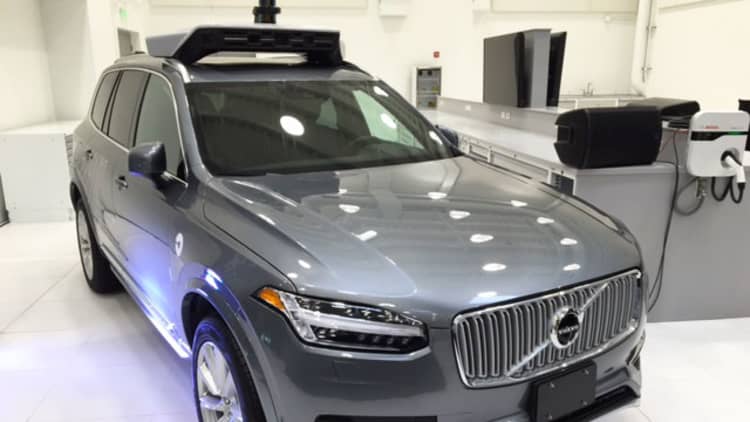
There's no doubt they stand out as they weave through Pittsburgh's streets.
Outfitted with cameras and sensors, Uber's test cars have been driving around the Pennsylvania city for weeks, to see how they handle different traffic situations at all times of the day.
Now, on Wednesday, the first self-driving Uber vehicles are moving into the next phase of their pilot program — giving real customers rides.
"I think the public is going to be delighted," said Anthony Levandowski, vice president of engineering at Uber. "You call an Uber and you are used to a specific experience. And now you have the future coming to you a little bit early."
Initially, a handful of Ford Fusions will drive passengers around Pittsburgh; eventually, the self-driving Uber fleet will grow to include modified Volvo XC90 crossovers.
While the vehicles will steer customers where they want to go, the ride-hailing company will keep a driver behind the wheel and an engineer in the front passenger seat, in case they need to intervene.
For Uber, developing self-driving cars is crucial to its long-term growth — and perhaps even its survival. Automakers including General Motors and Ford are testing self-driving cars as they explore whether they should some day run their own ride-hailing programs. Earlier this year, GM took an ownership stake in Lyft, while Toyota invested in Uber.
To gain an edge against the major auto and technology companies, Uber is moving quickly to be seen as the first ride-hailing company to incorporate self-driving cars, said Arun Kumar, a director with the consulting firm AlixPartners.
"It helps them to drive adoption. It helps them grab as much market share as possible," Kumar said. "With (Uber's) brand recognition, that is something that is going to make it easier."
Yet as hard as Uber and others in the space are pushing to get these cars into the real world, it will likely be many years before ride-hailing operators are able to eliminate drivers. Regulators have expressed hesitation about allowing fully autonomous cars on the road without someone behind the wheel, in case of an emergency.
As for Pittsburgh's residents, who will be asked if they're OK hitching a ride in a self-driving Uber before a vehicle is dispatched, they have split feelings.
"I would give it a shot. I'd hop in and ride around," said Greg Kretzler.
Not Bob Bernehe.
"I don't think the technology is there yet," he said. "Too many chances for an accident."
Levandowski and the Uber team have heard that skepticism before, but said they're confident their fleet of self-driving cars will change people's minds.
"This is the next level of safety, really allowing machine precision and machine execution to be able to bring more safety to driving," Levandowski said.
Questions? Comments? .


